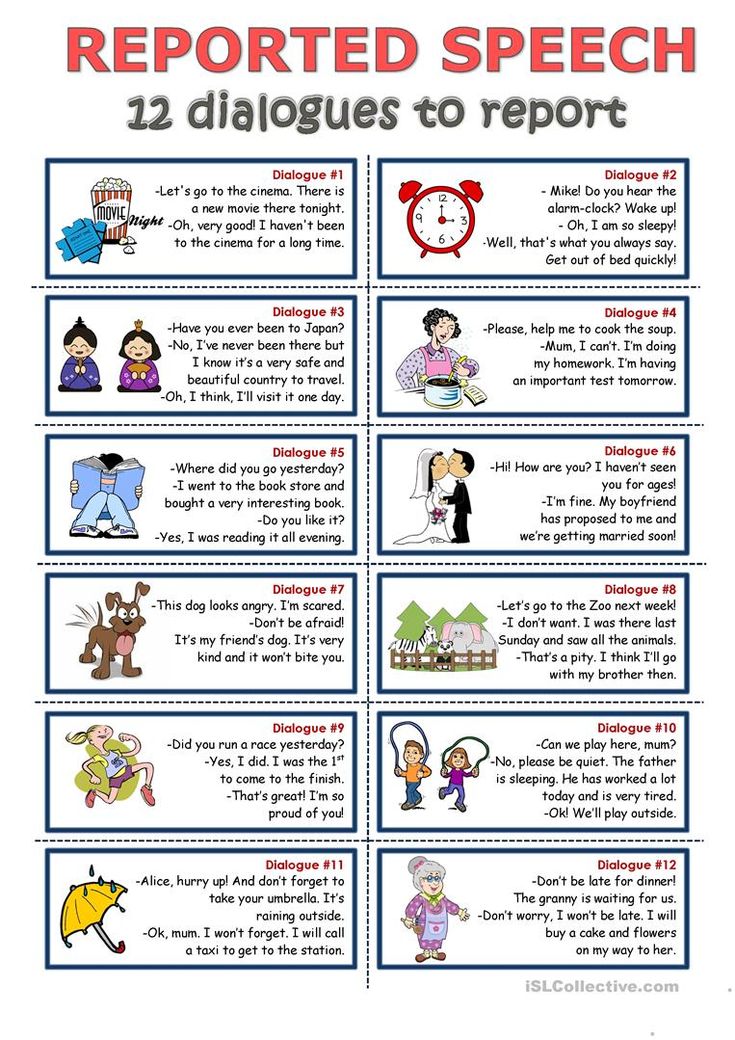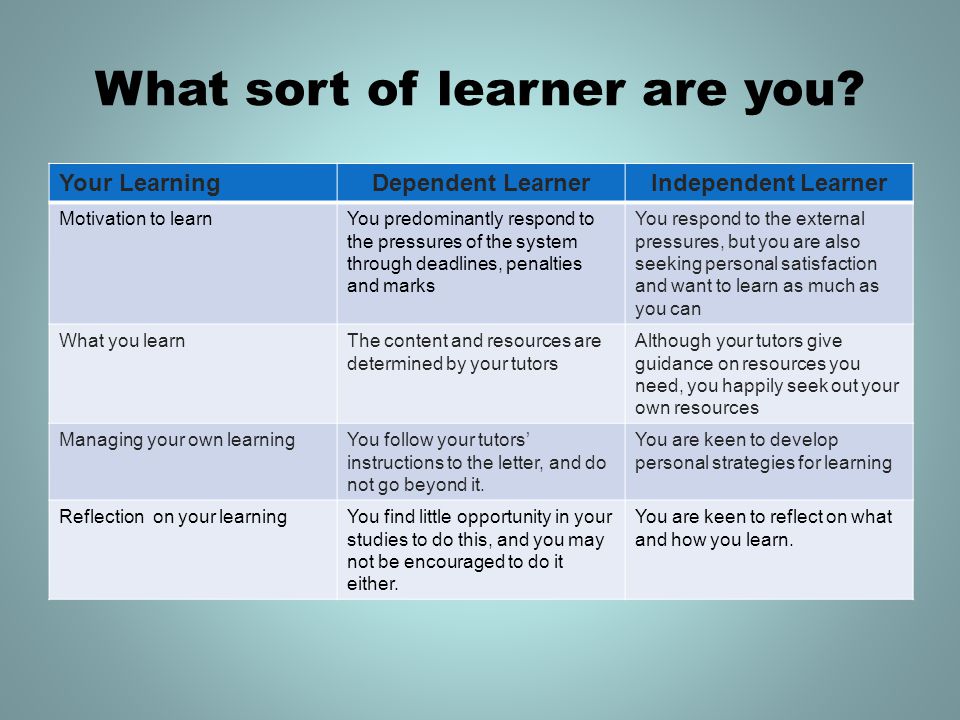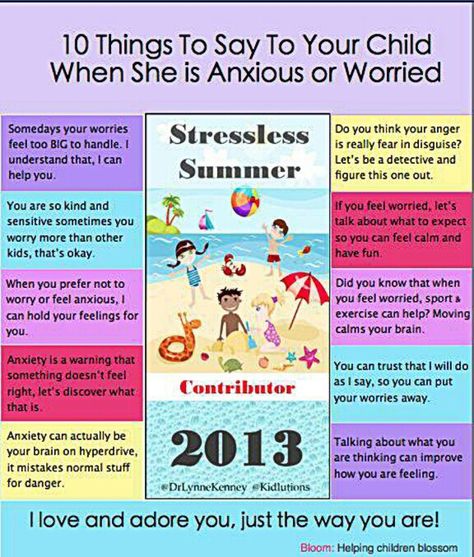How to stop being lazy and unmotivated
17 Healthy and Practical Strategies
Need a lazy day? It happens to the best of us. In these busy times, taking the occasional lazy day isn’t just alright but much needed.
But if you find that you’re taking lazy days more often than not, and you’re having trouble getting things done, it could be a sign that there’s something going on.
A lack of passion for your job, an overwhelming to-do list, and even an underlying medical condition are just some of the things that can interfere with your desire to get things done.
We cover all the bases here and tell you how to stop laziness so you can be more productive.
“How can I stop laziness?” The answer may not be as cut and dry as you’d expect. While some people may be more prone to being lazy than others, even highly productive people can find it challenging to get things done sometimes.
Here are some tips to help you get rid of laziness and get a grasp on your productivity.
1. Make your goals manageable
Setting unrealistic goals and taking on too much can lead to burnout. While not an actual clinical diagnosis, the symptoms of burnout are recognized by medical professionals. Job burnout can cause exhaustion, loss of interest and motivation, and a longing to escape.
Avoid overloading by setting smaller, attainable goals that will get you where you want to be without overwhelming you along the way.
2. Don’t expect yourself to be perfect
Perfectionism is on the rise and it’s taking a psychological toll.
One 2017 study that looked at college students between 1989 and 2016 found an increase in perfectionism over the years. Researchers noted “young people [are] now facing more competitive environments, more unrealistic expectations, and more anxious and controlling parents than generations before.”
This rise in perfectionism is causing people to be overly critical of themselves and others. It’s also led to an increase in depression and anxiety.
Another smaller study of college students concluded that expecting perfection was related to avoidant coping, which causes you to avoid dealing with stressors.
3. Use positive instead of negative self-talk
Negative self-talk can derail your efforts to get things done in every aspect of your life. Telling yourself that you’re a lazy person is a form of negative self-talk.
You can stop your negative internal voice by practicing positive self-talk. Instead of saying, “There’s no way I can get this done,” say, “I’ll give it my all to make it happen.”
4. Create a plan of action
Planning how you will get something done can make it easier to get there. Be realistic about how much time, effort, and other factors are needed to meet your goal and create an action plan. Having a plan will provide direction and confidence that can help even if you hit a hurdle along the way.
5. Use your strengths
Take a moment to think about what your strengths are when setting goals or gearing up to tackle a task. Try to apply them to different aspects of a task to help you get things done. Research has shown that focusing on strengths increases productivity, positive feelings, and engagement in work.
6. Recognize your accomplishments along the way
Patting yourself on the back for a job well done can help motivate you to keep going. Consider writing down all of your accomplishments along the way in everything you do, whether at work or home. It’s a great way to boost your confidence and positivity, and fuel you to carry on.
7. Ask for help
Many people believe that asking for help is a sign of weakness. But not asking for help could be setting you up for failure. A 2018 study found that people who don’t ask coworkers for help were more likely to be dissatisfied in their jobs and had lower levels of job performance. They were also perceived less favorably by their employers.
Asking for help improves your chances of success and helps you connect with others who can encourage and motivate you.
8. Avoid distraction
We all have our favorite distractions we turn to when we’re just not feeling like doing a task — whether it’s scrolling through social media or playing with a pet.
Find ways to make your distractions less accessible. This can mean finding a quiet place to work, like the library or an empty room, or using an app to block sites that you scroll mindlessly when you should be on task.
9. Make tedious tasks fun
We tend to avoid jobs that we find boring or tedious. Chores like cleaning the gutters or bathroom will never be loads of fun, but you can make them more enjoyable. Try listening music or a podcast, or put on your fitness tracker to see how many calories you burn or steps you get while performing these tasks.
10. Reward yourself
Getting a job done is a reward in itself, but some people are driven by external rewards. Focus on what you’ll gain from getting something done, like getting closer to a promotion, or reward yourself for a job well done. Celebrate the end of a big project with a night out or invite friends over for drink after a day of cleaning.
When it comes to how to stop laziness, making some healthy changes can be the best way to go.
1. Eat high-protein foods
Are you wondering “how can I stop being lazy?” Some foods increase your energy and keep your blood sugar stable so you’re less likely to feel sluggish and lazy. High-protein foods do this, such as:
- Greek yogurt
- almonds
- eggs
- tuna
2. Avoid sugary and high-fat foods
Nutrition and productivity are linked. Steer clear of foods that drain your energy because they’re slow to digest or cause blood sugar spikes. These include:
- foods and drinks high in sugar
- refined carbs, such as white bread and pasta
- alcohol
- fried foods and fast food
3. Exercise
Along with numerous other benefits, exercise is a surefire way to get rid of laziness. Just a few minutes of exercise can increase energy levels, improve mood, and reduce anxiety, stress, and depression — all of which can make you feel drained and unmotivated. Try a short walk or bike ride to combat that lazy feeling.
4. Sleep and rest
There are many things you can do to sleep better at night — from avoiding screen time just before bed to limiting nap time during the day.
Aim to get the recommended seven to nine hours of sleep each night to feel refreshed and ready to tackle the day ahead.
5. Manage stress
Stress can drain you so you feel too mentally and physically exhausted to do anything. Finding strategies for coping with stress can help improve your mood and give you back the energy and drive to get things done. Time with loved ones, cuddling a pet, and soaking in the tub are just a few ideas.
6. Carry water with you
The benefits of drinking water are endless and many can help fight laziness. Staying hydrated can boost energy levels and brain function. It also helps maximize physical performance. A few sips of water can also help perk you up if you’re feeling sluggish.
7. Quit smoking
Increased energy levels thanks to improved circulation and oxygen are just a couple of the benefits of quitting smoking.![]() Quitting can also boost your immune system, improve your sex life, and lower your risk of several serious conditions.
Quitting can also boost your immune system, improve your sex life, and lower your risk of several serious conditions.
Quitting smoking can be difficult, but your doctor can help you create a personalized plan of action.
Sometimes it’s not laziness, but a symptom of an underlying condition that may be stopping you from doing the things you should. If you find you’ve lost interest in doing things you would normally enjoy and don’t have the energy or focus to get things done, talk to a doctor.
Mental health conditions
Many mental health conditions can cause symptoms that you may mistake for laziness, such as lack of motivation, chronic fatigue, and social withdrawal. These conditions include:
- depression
- anxiety
- seasonal affective disorder (SAD)
- bipolar disorder
- post-traumatic stress disorder (PTSD)
- acute stress disorder
Medical conditions
Medical conditions can cause changes to your energy levels and prevent you from being able to function the way you normally would. Examples of these are:
Examples of these are:
- anemia
- vitamin deficiency
- thyroid disorders
- low blood sugar
- diabetes
- Addison’s disease
- chronic fatigue syndrome
- heart disease
- cancer
Laziness isn’t always a bad thing, and everyone deserves a slow day now and again. Figuring out how to stop being lazy may be as simple as changing the way you approach certain tasks and adopting healthier lifestyle.
If you’re having trouble finding the energy and desire to do things more often, speak to a doctor to determine if an underlying medical condition may be responsible.
Why Am I So Lazy? How to Stop Being Lazy and Take Control
Article by Thomas J Law
Want to learn how to stop being lazy? Don't – it won't work.
Here's the thing: You're not actually lazy. There's something else going on with your emotions under the surface that's making you act lazy.
However, although the causes of laziness are often hidden from us, their disastrous consequences are all-too-obvious.
"Laziness erodes a person of his enthusiasm and energy. As a result, the person loses all opportunities and finally becomes dejected and frustrated," says the Sama Veda Kabir, an ancient Vedic Sanskrit text. "The worst thing is that he stops believing in himself."
If this sounds a bit like you, don't worry – this article will teach you how to stop being lazy and unmotivated.
How to Stop Being Lazy and Unmotivated in 8 Simple Steps
There's no point trying to learn how to "fight laziness" – you can’t win if you don’t know what you’re up against.
If you want to know how to stop being lazy, you need to understand why you act lazy in the first place, then develop the emotional regulation tools you need to change.
Here are eight tips to overcome laziness that will show you how to stop being lazy and unmotivated for good:
- Realize that you're not inherently lazy
- Learn the real causes of laziness
- Gain perspective with a simple but powerful question
- Connect with your inner motivation
- Take responsibility and empower yourself
- Create an action plan
- Be kind to yourself
- Track your practice
Alright, let's get started.
Step #1. Realize That You're Not Inherently Lazy
First things first: you're not lazy – your behavior is.
After years of acting in a certain way, it's common to think that "this is just the way I am." However, nothing could be further from the truth.
Repetitive behaviors create habits, and our habits determine the state of our lives – but they don’t define who we are.
Sir Fowell Buxton, the 1st Baronet and 18th-century British politician, said, "Laziness grows on people; it begins in cobwebs and ends in iron chains." These iron chains may feel like they're part of you, but they're not – they're just chains, and you can remove them.
Still, cobwebs are easier to remove than iron chains.
In other words, the longer you've acted lazy, the more challenging it can be to become productive and satisfied – but it's entirely possible!
So, if you're not intrinsically lazy, where does laziness come from?
Step #2. Learn the Causes of Laziness
Do you keep asking yourself, "why am I so lazy and unmotivated?" If so, this section's for you.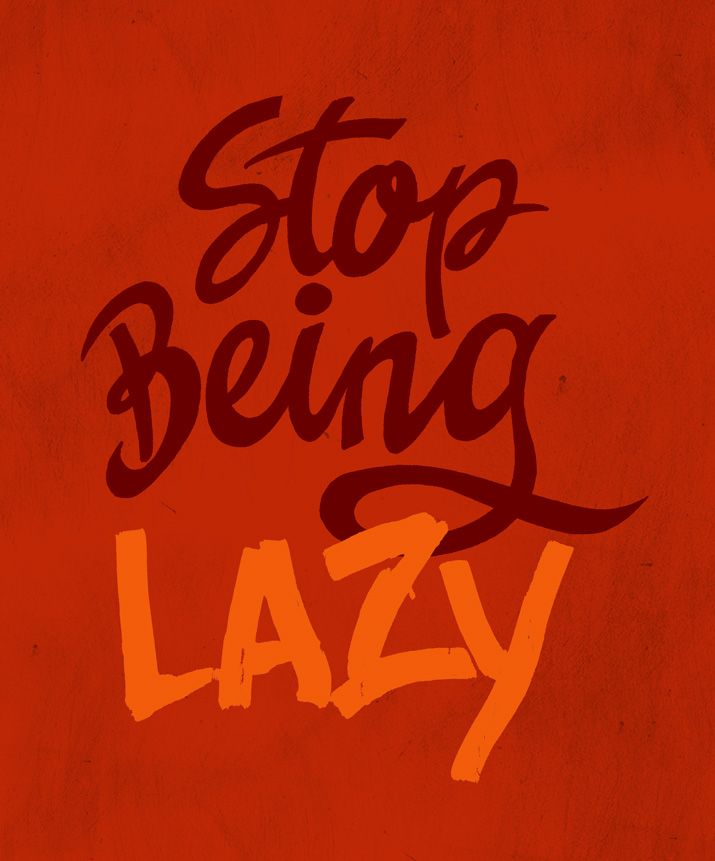
When learning how to stop being lazy, you need to know what you're up against. It turns out there are many reasons for laziness. According to Laura D. Miller, LCSW, a licensed psychotherapist and psychoanalyst:
"'Laziness' is an overused criticism – a character judgment, really – that does nothing to help us understand why someone doesn't exert the effort to do what they want to do, or are expected to do, If we take a moment to examine what's behind the procrastination and avoidance, we find a range of more complicated issues."
Miller believes there are seven main causes of laziness:
- Fear of failure
- Fear of success
- Shame
- Fear of expectations
- Fear of conflict
- Need for nurture
- Depression
Each of these reasons for laziness stems from a belief we hold about ourselves or life in general.
Here's the aim of the game: Try to figure out what belief (or beliefs) you hold that are creating laziness.
1. Fear of Failure
Do you hate to mess up or fail? Does how you feel depend on your performance? When this happens, we become afraid of failure.
In this state, failure isn't seen as a necessary part of learning and growing – it's viewed as a fact about our character. We don't think, "I failed this once and can learn from it," instead, we believe, "I am a failure."
With this kind of pressure, it's no wonder we don't want to take action. Extreme laziness protects us from the pain of feeling like a failure.
2. Fear of Success
As odd as it may seem, many people fear success.
Often, people who fear success hold a low opinion of themselves and don't believe that they're worthy of success, recognition, happiness, financial freedom, or joy.
Remember, no matter how hard we try we can't act in opposition to our core beliefs.
If we genuinely believe that we don't deserve success or happiness, it won't matter what we do. Our subconscious mind will drive us to act in a way that ensures we’re never successful or happy.
3. Need for Rest and Recuperation
Many people believe they should squeeze productivity out of every minute of the day and feel guilty when they don't.
So, what's driving them?
Although there are many reasons, these people are often driven to “do” because their productivity defines their self-worth.
But here's the thing: If our bodies, hearts, or minds need rest, they will find a way to get it – often by forcing us to act lazy. In this instance, we need to take care of ourselves and make time to relax guilt-free.
So, when learning how to stop being lazy, remember what the businessman Alan Cohen said: "There is virtue in work and there is virtue in rest. Use both and overlook neither."
4. Fear of Expectations
Many people act lazy so that other people don't expect much from them – they want to lower the bar.
There are many reasons they may want to do this. For example, they may fear not measuring up to other people's expectations when it comes to things like performance, wealth, or relationships.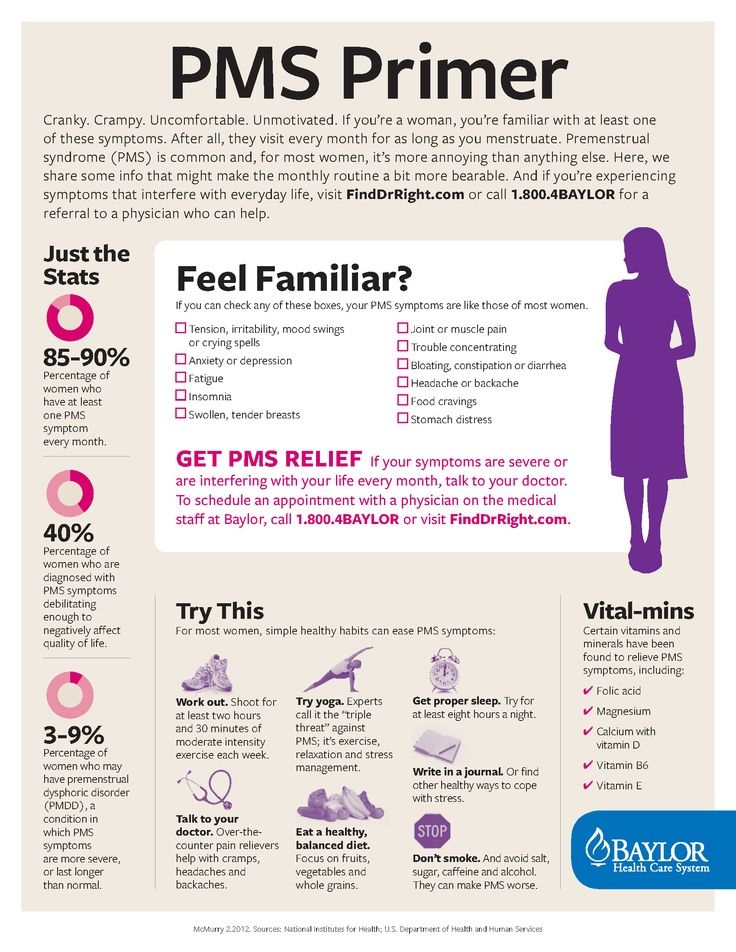 They also may fear being judged, or perhaps they don't want to feel beholden or controlled by others.
They also may fear being judged, or perhaps they don't want to feel beholden or controlled by others.
5. Fear of Conflict
Fearing conflict with others can create laziness in several ways.
Some people who avoid conflict will bottle-up their feelings of anger and resentment and may use laziness as a way to be passive-aggressive. However, this very tactic can cause even more conflict.
6. Need for Nurture
We all need to feel loved, cared for, and supported.
When we don't experience these vital emotions in our relationships, laziness can be a way to force the other person to pay more attention to us. For example, if we don't do our laundry, our partner might get fed up and do it for us, which could make us feel cared for and supported.
Of course, this unconscious behavior to get our emotional needs met pushes our loved ones away over time.
7. Depression and Anxiety
Finally, there's a chance that you could be unmotivated and acting lazy due to depression or anxiety. Depression and anxiety are often mistaken for laziness or disinterest.
Depression and anxiety are often mistaken for laziness or disinterest.
If you feel like you may be depressed or unreasonably anxious, there's no shame in seeking help. There are plenty of resources available online and in your local community.
Step #3. Gain Perspective with a Simple Question
Once you've identified the causes and symptoms of laziness, it's time to work on your mindset. A great way to start is to ask yourself:
"What will my life be like in one year, two years, five years, and ten years if I don't make a change?"
This can be an incredibly uncomfortable and scary question. You may realize that you would never achieve your goals or create the relationships you want in life. Perhaps you'll feel a little scared by the answers.
However, if you want to stop being lazy, this question can help clarify the necessity of change – it can help create a sense of urgency to improve yourself.
Don't forget what the leadership coach and author, Marshall Goldsmith, said, "What got you here won't get you there.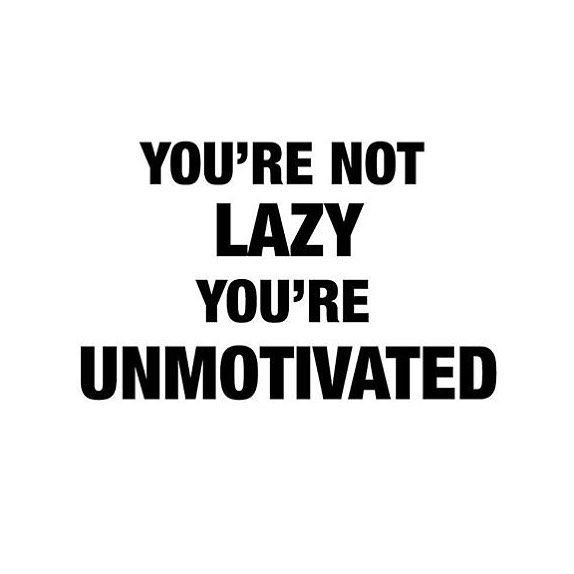 "
"
Step #4. Connect With Your Inner Motivation
Now that you've identified what you don't want to happen, it's time to determine what kind of life you want.
How do you want to feel? What kind of relationships will you have? What do you want to do? Whether you want to be your own boss or travel the world, get creative – you could even create a vision board.
"Create the highest grandest vision possible for your life, because you become what you believe," said media mogul Oprah Winfrey.
Step #5. Take Responsibility and Empower Yourself
At this point, you should have a clear understanding of where you are and where you want to be.
Now, before you start working towards the life you want, you need to take back control of your life – to remember how capable and powerful you can be.
How can you do this? It's simple: Take responsibility for your future.
It doesn't matter where you are, what life's like, or how badly you've been treated in the past: It's your life, so you're responsible for improving it.
As the entrepreneur and author Stephen R. Covey said, "I am not a product of my circumstances. I am a product of my decisions."
Step #6. Create an Action Plan
There are many different ways to stop being lazy, so you need to create a roadmap to navigate to the life you want.
To find out what you need to do, get inspiration from people you admire – what do they do to succeed and be happy? What do they suggest?
Start small.
Perhaps you could create a morning routine, begin working out, start meditating, or build a side hustle. Whatever you decide, keep it simple and don't try to do too much at once.
Once you've created an action plan, focus on taking action consistently.
The famous self-help author Dale Carnegie said, "Inaction breeds doubt and fear. Action breeds confidence and courage. If you want to conquer fear, do not sit home and think about it. Go out and get busy."
Step #7. Be Kind to Yourself
If you want to learn how to stop being lazy, you must practice self-compassion.
This means that if you make a mistake, waste some time, or can't stop procrastinating, don't beat yourself up. Negative self-talk will only feed the emotions that make you act lazy.
It doesn't matter if you've messed up a million times in the same way – you can't do anything about those times except learn from them and apply the lessons in this moment.
So, practice valuing yourself.
"Until you value yourself, you won't value your time. Until you value your time, you will not do anything with it," said the psychiatrist and author Morgan Scott Peck.
Step #8. Track Your Practice
Finally, learning how to be less lazy requires practice – and every small effort matters.
Vincent Van Gogh, the famous impressionist painter, said, "Great things are not done by impulse, but by a series of small things brought together."
However, when trying to make small, consistent changes, it's difficult to measure our actions with our minds alone. We may feel like we're doing brilliantly when in reality, we haven't practiced in days.
So, write things down to keep track of your practice.
For example, you could create a spreadsheet, download a habit tracking app, or even report your progress to a friend or loved one each day.
Remember, you can't control your progress – you can only control your practice. So, don't worry about your progress – that will happen if you practice.
Summary: How to Overcome Laziness
If you're feeling lazy, you may wonder if it's "just who you are." It isn't.
You're not inherently lazy. Instead, there are deeper emotions at play that are leading you to act lazy. Because of this, it's completely possible to learn how to stop laziness for good.
If you want to learn how to stop being lazy and unmotivated, here are eight steps to follow:
- Realize that laziness is a symptom of your emotional state
- Identify what's really making you act lazy
- Explore what life will be like if you don't improve yourself
- Determine what you want life to be like and get motivated
- Empower yourself by taking responsibility for your situation
- Create an action plan to help you create the life you want
- Practice self-compassion and don't dwell on mistakes
- Track your practice and focus on consistent daily wins
To finish, remember that learning how to stop being lazy isn't a quick and easy process – it requires practice, effort, and self-compassion.
However, it's well worth it – as the diarist Anne Frank once wrote, "Laziness may appear attractive, but work gives satisfaction." So, go get some satisfaction!
Start selling online now with Shopify
Start your free trial
Want to Learn More?
- 11 Best Motivational Podcasts That Will Unleash Your Potential
- 25 Money Blogs: The Best Personal Finance Blogs in 2021
- Must-Read Books of All Time: 40 Books Everyone Should Read
- How to Train Your Brain for Success: 7 Mind Training Tactics
9 ways to stop being lazy
Each of us at least once was lazy to do something, and this is absolutely natural. On the one hand, laziness means that you do not want to waste time and energy on unjustified actions. On the other hand, sometimes it causes some difficulties. If you become lazy and stop being motivated, you will stop doing anything to achieve your goal and you may run into problems in your personal life and at work.
However, there are several tactics that will help you overcome laziness.
1. Learn to put up with your laziness
If you overdo it in the fight against it, it may not be productive at all. Giving up what you love can lead to increased stress, low mood, low self-esteem, and lack of motivation.
To get rid of these conditions, you just need to acknowledge the existence of laziness and come to terms with it. Laziness is a normal and natural thing. However, in order not to feel guilty, you need to understand that sometimes it is possible and even necessary to be lazy.
2. Find the source of laziness
This is one of the most difficult steps, but at the same time one of the most important. When you find what makes you lazy, you can figure out how to prevent it.
For example, ask yourself if you feel a rush of laziness at any particular time of the day, or if the lack of motivation comes from being forced to do something you don't like. Tracking the reasons, time, type of work will give you the opportunity to understand if there is a pattern in your laziness.
Tracking the reasons, time, type of work will give you the opportunity to understand if there is a pattern in your laziness.
3. Change your habits
In many cases laziness is the result of habit, especially if you lose motivation in certain conditions (as we described above). You can reduce laziness by breaking the usual rituals and cycles. This becomes especially important if you work from home or, conversely, sit in the office all day. Try changing your route on your way home, try something new for breakfast, complete a task at a different time. Any change will affect you and your habits.
4. Do something small
Feeling successful can be a good motivation for you. The energy you feel after a job well done will give you strength for other tasks. Make a to-do list from easy to hard to gradually build momentum throughout the day.
There are some tips on how to optimize your routine. If a task takes less than two minutes, do it right away. The five second rule is something like this: when you feel a rush or a strong urge to do something productive, use those five seconds to start acting on impulse.
An activity that you like will help you overcome your stupor in the middle of the working day, even if it takes you a little away from your plan.
5. Make the most of your laziness
Sometimes being lazy is good for you. Therefore, if you decide to relax after a hard day, make the most of it.
For example, when you feel that you are losing motivation to work, take a few days off. Scientists have repeatedly proven that timely rest has a positive effect on the state of the body and human performance.
On one dimension of the Gallup-Heathway Global Well-Being Index, physical well-being (health and energy levels), frequent travelers average 68.4 and non-travelers 51.4.
6. Set realistic goals for yourself
Sometimes laziness can overwhelm you when you set yourself a task that is too serious and overwhelming. Its weight can scare, so I want to delay the moment of its implementation.
Suppose you planned to run 15 kilometers, and the air temperature exceeded all conceivable norms. Heavy physical activity is difficult even for an experienced athlete. Such an impossible task will make you put it off until later. Instead, if you really want to, you can cut the distance to five kilometers - it's definitely better than not running at all. Don't be afraid to lower the intensity if you feel unmotivated.
Heavy physical activity is difficult even for an experienced athlete. Such an impossible task will make you put it off until later. Instead, if you really want to, you can cut the distance to five kilometers - it's definitely better than not running at all. Don't be afraid to lower the intensity if you feel unmotivated.
7. Reward yourself
Such is human nature: if there is a reward at the end of a difficult journey, then motivation and a desire to deal with it as quickly and efficiently as possible appear. In this case, you can just treat yourself - this approach will help when laziness has overcome you.
After completing the task, treat yourself to something tasty, buy something that you have long wanted, or just let yourself relax and take a break from the hustle and bustle.
8. Set up escape routes and block them
This is a really important moment if you suddenly decide to fight your laziness. Surely you can remember the times when you scrolled aimlessly on social networks, watched all the suggested videos on YouTube, or said to yourself: “One more episode, and that’s it” - and then turned on the next one. Find out what is most often repeated in your procrastination plot, and do everything possible to avoid it.
Find out what is most often repeated in your procrastination plot, and do everything possible to avoid it.
The easiest way in this matter is to turn off notifications on the phone, temporarily refuse access to the Internet, do not do important things in the room with the TV on.
You can also shield yourself from all distractions. Tidy up your desk, hide the comic book that you flip through every time it catches your eye, put away the chips that take up part of the time you set aside for work.
9. Give up perfectionism as much as possible
No, you don't have to immediately give up your beliefs and views. But remember that perfectionism is the enemy of your productivity. It is he who makes you feel lazy and unmotivated.
Scientists have also proven this: people with a high perfectionism score have a 51% higher risk of dying earlier than others. In other words, it affects not only your productivity, but also your health.
Understand that every person has the right to make mistakes, and blaming yourself for not being perfect is stupid.
Other related articles:
laziness
7 working ways to stop being lazy0003
"I will always choose a lazy person to do the hardest job, because he will find the easiest way to do it."
- Bill Gates
It's okay to feel lazy. Even the most productive people experience laziness. It `s naturally. Being lazy, in the normal sense of the word, means that you want to spend as little effort as possible to achieve something. Well, who in their right mind would want to do something and spend extra time or energy where it is not justified?
However, one should not confuse rational and destructive laziness. Destructive laziness prevents us from getting the desired results or achieving our goals. It is like the dark side of our consciousness, which destroys both personal and professional lives. Today Notagram.ru talks about a strategy that will allow you to defeat laziness and everything connected with it.
7 working ways to stop being lazy
Learn to accept your own laziness
Photo: Silvia Sala/flickr
To break free from laziness, you have to learn to accept your own laziness. It's okay to feel lazy. It is not normal to be offended and scold yourself for being lazy. This leads to a cycle of negative consequences that do not have the best effect on you as a whole. It is important to accept your laziness and start working on coping with it without feeling guilty or uncomfortable.
It's okay to feel lazy. It is not normal to be offended and scold yourself for being lazy. This leads to a cycle of negative consequences that do not have the best effect on you as a whole. It is important to accept your laziness and start working on coping with it without feeling guilty or uncomfortable.
Find your source of laziness or lack of motivation
Take time to understand the roots of your laziness or lack of motivation. This is one of the most difficult steps, but also one of the most important. Pay attention to your surroundings, the time of day, the people around you, and the type of work you do. For example, do you feel unmotivated at certain times of the day? Does laziness appear when a certain work falls on you? There are special signals that you must recognize.
Try to outsmart laziness
In many cases laziness is a by-product of our habits, circumstances or beliefs. For example, you may feel lazy at the same time of the day, or in certain circumstances. Accordingly, you can reduce the effects of laziness by simply breaking your habits and cycles. This is especially important if you work from home or are constantly cleaning up your office routine.
Accordingly, you can reduce the effects of laziness by simply breaking your habits and cycles. This is especially important if you work from home or are constantly cleaning up your office routine.
Set reasonable goals
Sometimes the reason for laziness is simply that we overestimate our strength. For example, in the morning we plan to clean the house, go to the store, cook dinner, and still have time to do the laundry. It is clear that you have enough strength only for half of this. Even if you do everything in time, the effectiveness of what you have done will be much lower than if you consciously do only what you have enough for. No need to exhaust yourself with unattainable or ineffective, and then blame that you did not have time or you do not succeed.
Replace perfectionism with rationalism
Perfectionism is the enemy of productivity in the best sense of the word. This habit can make you feel less motivated and lazy just because you can’t or don’t have time to do what you wanted. Take the rational side of what is happening. Whether you bake one small but delicious cake, or ruin two large cakes: in which case will you be more motivated and feel better? Do what you can do and not a grain more.
Take the rational side of what is happening. Whether you bake one small but delicious cake, or ruin two large cakes: in which case will you be more motivated and feel better? Do what you can do and not a grain more.
Remove heavy people from your environment
Heavy people are those who drag you down. If you are surrounded by lazy people who often complain and are usually always pessimistic, it is impossible not to absorb the same negative emotions and feelings. In the end, you will turn into one of your familiar lazy whiners. Remove these people from your social circle. Let those who radiate energy, vivacity and motivation. Such people, like living batteries, are able to charge others, and not drag them to the bottom with them.
Turn your laziness into something productive
Remember that productivity is not about how much effort you put in, but how much you can do. Laziness may motivate you to develop an algorithm or come up with something that will help you more efficiently and quickly deal with a particular task.
